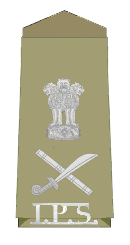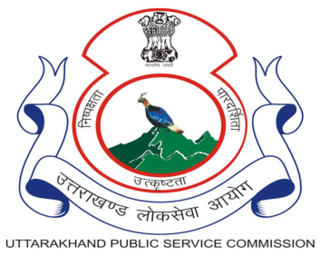UPSC may refer to:
- Union Public Service Commission of India
- Urban Planning Society of China
- Uttarakhand Public Service Commission of Uttarakhand, India
UPSC may refer to:

Director general of police (DGP) is a rank in the Indian Police Service, held by the highest ranking police officer in a State or a Union Territory of India, typically heading the state or the UT police force. The DGP is appointed by the cabinet and holds a three-star rank.
Special Class Railway Apprentice (SCRA) was a programme by which candidates are selected by the Union Public Service Commission (UPSC) India, to train in the undergraduate program in mechanical engineering at the Indian Railways Institute of Mechanical and Electrical Engineering, Jamalpur. This programme started in 1927 and is one of the oldest in India.

The Union Public Service Commission, commonly abbreviated as UPSC, is India's premier central recruitment agency for recruitment of all the Group 'A' officers under Government of India. It is responsible for appointments to and examinations for the Group 'A' posts of several central government establishments which also includes the central public sector undertakings and the central autonomous bodies. While Department of Personnel and Training is the central personnel agency in India.
The Indian Railway Service of Mechanical Engineering, abbreviated as IRSME, is one of the group 'A' central engineering services of the Indian railways. The officers of this service are responsible for managing the Mechanical Engineering Division of the Indian Railways. Till 2019, IRSME officers were drawn from the Combined Engineering Service Examination (ESE) conducted by Union Public Service Commission. All appointments to the Group 'A' services are made by the president of India.
The Civil Services Examination (CSE) is a national competitive examination in India conducted by the Union Public Service Commission for recruitment to higher Civil Services of the Government of India, including the Indian Administrative Service, Indian Foreign Service, and Indian Police Service. It is also colloquially referred to as the UPSC examination, and UPSC CSE. and is conducted in three phases: a preliminary examination consisting of two objective-type papers, and a main examination consisting of nine papers of conventional (essay) type, in which two papers are qualifying and only marks of seven are counted; finally followed by a personality test (interview). A successful candidate sits for 32 hours of examination during the complete process spanning around one year.
The Combined Defence Services Examination is conducted by the Union Public Service Commission for recruitment of Commissioned Officers in the Indian Military Academy, Officers Training Academy, Indian Naval Academy and Indian Air Force Academy. The Notification for the examination is usually released in the months of December and May, and the examinations are conducted in April and September respectively. Only unmarried graduates are eligible to sit for the exam. Examination is conducted twice a year. Successful candidates are admitted into the respective Academies after an interview conducted by the Services Selection Board (SSB).

Kailasa Venkata Ramiah was an educationist from Andhra Pradesh, India. He was born in Pegallapadu village of Khammam district. He stood first-in-first in both B.Sc and M.Sc from Osmania University and grew to head the Physics Department of Osmania University. He is recipient of the Sir Akbar Hyderi Gold medal and several awards during his career both as student and later as an academician. He finished his PhD in record time and later his research was in quantum mechanics and Raman effect. He published about 100 papers in both national and international journals. He served to become the first Vice-Chancellor of Kakatiya University (1976–79). He founded the University from its inception. It was his vision and efforts that led to the development of Kakatiya University in a short period of time.
The Indian Telecommunications Service,( भारतीय दूरसंचार सेवा) widely known as ITS, and earlier known as 'Telegraph Engineering Service Class I' is one of the gazetted central engineering services officer under Group 'A' of the executive branch of the Government of India. The appointment to this service is done through Combined Engineering Services Exam held every year by Union Public Service Commission (UPSC) of India. The service was created to meet the technological needs of the government in areas related to telecommunications. The Department of Telecommunications (DOT) had been managed for years by the officers of this permanent cadre, called the Indian Telecommunications Service (ITS).The officers of ITS work under restrictions and rules of Central Engineering Services (Conduct) rules.
The State Police Services (SPS), also simply known as State Police, are the police services under the control of respective state governments of the States and union territories of India.
The Combined Medical Services Examination or the CMS Examination is conducted by the Union Public Service Commission for recruitment as Medical Officer in various organisations such as the Indian Ordnance Factories, Indian Railways, Municipal Corporation of Delhi, New Delhi Municipal Council functioning under the Government of India. The Notification for the examination is usually released in the month of April and examination is conducted in July. Successful candidates are admitted after an interview conducted by the UPSC for those having qualified the written examination.
To face the shortage of Indian Police Service officers in India as a result the high attrition in the Indian Police Service, the Ministry of Home Affairs proposed the formation of Indian Police Service Limited Competitive Examination to be conducted by UPSC. IPS Limited Competitive Examination was held for the first time in 2012. This is in addition to the Civil Services Examination conducted by UPSC itself, for recruitment to the various civil services including Indian Police Service.The Central Administrative Tribunal(CAT) has struck down the examination following the challenge by some state cadre police officers. Consequent to the CAT verdict, UPSC has withheld the declaration of final results of 2012 examination. Now the Ministry of Home Affairs is trying to sort out the legal matters as soon as possible.
David Reid Syiemlieh is an Indian academician and the former Chairman of the Union Public Service Commission of India. He studied in Dr Graham's Homes, Kalimpong (1958–1970) and graduated with history honours from St.Edmund's College, Shillong. This was followed with a master's degree in History (1976), MPhil (1980) and PhD (1985) from the North Eastern Hill University, Shillong. He taught undergraduates in St. Edmund's College (1977–1979) before joining the Department of History, NEHU, in 1979. He rose in the profession to become a Professor in the Department of History. He held numerous positions in the University, including Dean of Students' Welfare; Head Department of History; Controller of Examinations; Registrar and Pro-Vice-Chancellor. Prof. Syiemlieh, is a former vice-chancellor, Rajiv Gandhi University, Doimukh, Arunachal Pradesh.

Articles 315 to 323 in Part XIV of the Constitution of India provides for the establishment of Public Service Commission for the Union of India and a Public Service Commission for each State. The same set of Articles of the Constitution also deal with the composition, appointment and removal of members, power and functions and independence of a Public Service Commission. Union Public Service Commission (UPSC) to conduct examinations for recruitment to the "All India Services" (AIS) and the "Higher Central Services" (HCS) and to advise the President on disciplinary matters. State Public Service Commission in every state to conduct examinations for recruitment to state services and to advise the governor on disciplinary matters.
Sujata Mehta is a former Indian Foreign Service officer, currently serving as a member of the Union Public Service Commission.

Nagaland Public Service Commission, abbreviated as NPSC is a constitutional body established in 1965 by the Government of Nagaland. It is responsible for conducting Civil Services examinations and Competitive Examinations to select the eligible candidates for various civil services and departmental posts.

Karnataka Public Service Commission, chiefly known as KPSC is a government agency of Karnataka state, aimed to make recruitments to various civil services through competitive and departmental examinations in its jurisdiction under the area of 191,791 km2.

Madhya Pradesh Public Service Commission, publicly known as MPPSC is a state government-led agency of Madhya Pradesh state. It was constituted under the state and Union Public Service Commission Article-315, responsible for conducting civil services examinations and competitive examination. It makes direct recruitments to various civil services and departmental posts at state level.
Sreedhanya Suresh is an Indian Administrative Service officer. She is the First Tribal Woman from Kerala to have cleared Civil Services Examination conducted by Union Public Service Commission, India. She secured an all India Rank of 410 in the 2018 UPSC Civil Services Examination. She is currently serving as Sub Collector and Revenue Divisional Officer of Perinthalmanna.
Deepak Rawat is an Indian civil servant who serves in the Uttarakhand cadre of the Indian Administrative Service (IAS). Rawat is currently posted as the Commissioner of Kumaon division, Uttarakhand.